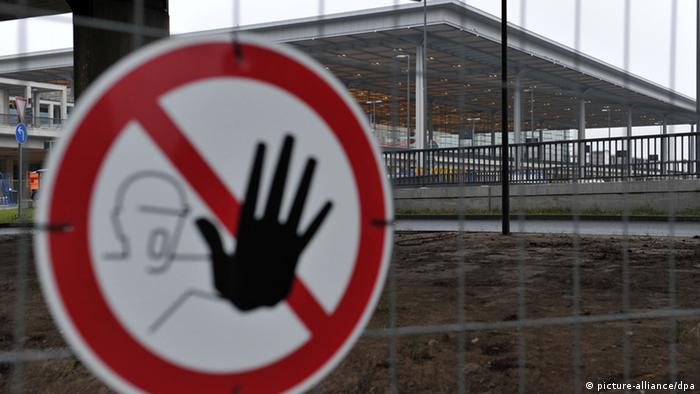
Many large construction projects in Germany have been delayed and end up
costing much more than projected. Experts in the field say that these
problems are built into the bidding and contracting system.
The construction of the Elbe Philharmonic Hall in Hamburg, the
rebuilding of the Stuttgart train station and the botched installations
of Berlin's new and as yet unopened airport are only the most prominent
examples. Germany's major construction sites are often plagued by delays
and excessive cost overruns, feeding the impression that Germans just
can't get things right.
And indeed, it seems that, generally, something is out of kilter. This is perhaps best illustrated by the simple fact that there are now legions of experts who do nothing but analyze mistakes on major construction projects.
One of them is Thomas Heilfort. The lecturer at the Technical University of Dresden has been working for 17 years as an expert on so-called "construction work interruptions." Heilfort leaves no doubt: "A public construction project is doomed to failure, because the procedures for large-scale projects are plagued by system errors." As examples, Heilfort named insufficient time buffers to react to unexpected developments and too many levels in the building site hierarchy.
Many construction experts agree, including architect Horst Keller and economist Friedhelm Lütz, both of whom have more than twenty years' experience in the industry. With their company "Building Values" they have even developed their own field of business, helping huge private projects avoid the mistakes of government contractors. Both say: "The main mistake is due to a lack of teamwork and conditions that few people can follow."
Madness to the method
Again and again the question is asked: Who is to blame for the mistakes and who bears the responsibility? It is evidently more than just incompetent politicians who are responsible. Heilfort, Keller and Lütz describe a kind of vicious circle, in which blame and responsibility are spread across many shoulders. Everything starts with over-ambitious schedules and cost plans. Building codes and regulations are an extra straitjacket. Public sector contractors, for example, must issue tenders for all work on a project.
The most important consideration here is price. Because there is a lot of competition in the construction industry and many companies compete for contracts, they underbid each other. Companies quote prices that they themselves know they cannot keep. This is entirely risk-free for a craftsman's business, Heilfort said. "Most calls for tenders are full of errors."
Because this is so, the participants in tenders specifically look for these errors in advance of their offer, make calculations that account for these errors and later, after they have been awarded the contract, make financial claims. All of this is perfectly legal. The process even has an official name: "claim management."
Keller and Lütz said that companies awarded contracts for some individual work often do not even have an accurate detailed design available until construction begins. This means that a construction firm is contractually bound to prices and dates, even though there are no final plans. Even so, craftsmen are pressured to begin work, at least in some areas. Specific issues, such as which cables in a roof should be worked on, are later clarified with "construction-accompanying implementation planning."
For large infrastructure projects, implementation planning is left completely to the company itself to save money and to delegate responsibility. This leeway offers plenty of room for misunderstanding and bad planning, Keller and Lütz said.
Start work first, think later
Change requests and bad planning often mean that specially manufactured products can no longer be used, or that completed construction work must be removed, Heilfort said.
Many problems could be avoided if the construction did not begin until the final design was completed. A discussion ahead of time with craftsmen considered the best in their respective fields would help, they said - but before the tendering phase begins.
 The opening of Berlin's new airport has been delayed four times and is suffering from exorbitant cost overruns.
But German public procurement law forbids contacts between clients
and potential contractors in cases of public projects. "No contractor
shall have an information advantage before a tender," Lütz said, quoting
the guidelines, otherwise they could lose their right to participate in
the tendering process. Indeed, envious rivals regularly complain about
real or alleged discrimination in procurement. Such complaints by
themselves can delay a construction project immensely before the first
ground is broken.
The opening of Berlin's new airport has been delayed four times and is suffering from exorbitant cost overruns.
But German public procurement law forbids contacts between clients
and potential contractors in cases of public projects. "No contractor
shall have an information advantage before a tender," Lütz said, quoting
the guidelines, otherwise they could lose their right to participate in
the tendering process. Indeed, envious rivals regularly complain about
real or alleged discrimination in procurement. Such complaints by
themselves can delay a construction project immensely before the first
ground is broken.
Monitoring comes late
Of course there are inspectors and overall supervision on a major German construction site. Work is recorded and signed off in daily construction reports. But all projects with mistakes lacked a deadline monitor to coordinate all activities and intervene with partners, Heilfort said.
Lütz and Keller added, "The individual companies on a construction site are actually only interested in the job and the contract." All other work is irrelevant to them. If there is an unforeseen problem at only one point, this builds gradually to an avalanche of delays. "If there were now independent and autonomous teams on building sites, many problems could be solved together quickly, and it would also make monitoring measures unnecessary," Lütz and Keller said.
Rigid hierarchical thinking is harmful, they said. Of course, everyone tries to rescue the situation in the event of problems, but they try for too long to solve problems at the lowest level and alert supervisors only when all else fails. "Everybody is trying to save face and avoid mistakes."
Regulatory supervision only begins when a construction project is completed. Then the authority asks for the certificates of approval for the installed products. These generally have an expiration date. When construction is delayed, in the worst case, these approvals are no longer valid. "Then everything must be torn open again and re-installed," they said.
Politicians are not always responsible
 Berlin Mayor Klaus Wowereit (l) and Brandenburg Premier
Matthias Platzeck have been getting heat for the Berlin airport fiasco.
Calls for the resignation of politicians who are supposedly
responsible are highly unrealistic, in the opinion of all the surveyed
construction experts. Politicians on supervisory boards who are supposed
to watch over a construction project are usually the last to hear what
is actually going on at the building site. In addition, there is a lack
of expertise to effectively monitor such a complex process as a major
building site. Competent experts are missing at crucial points.
"Politicians love models, posters, opening ceremonies and the ability
to boost their own profile," Heilfort said; this is the nature of
politics.
Berlin Mayor Klaus Wowereit (l) and Brandenburg Premier
Matthias Platzeck have been getting heat for the Berlin airport fiasco.
Calls for the resignation of politicians who are supposedly
responsible are highly unrealistic, in the opinion of all the surveyed
construction experts. Politicians on supervisory boards who are supposed
to watch over a construction project are usually the last to hear what
is actually going on at the building site. In addition, there is a lack
of expertise to effectively monitor such a complex process as a major
building site. Competent experts are missing at crucial points.
"Politicians love models, posters, opening ceremonies and the ability
to boost their own profile," Heilfort said; this is the nature of
politics.
Lütz complained, however, that no one really has to fear being held accountable. Processes are delayed for so long that a politician is often no longer in office when everything gets out of hand.
"Politicians must urgently abolish the abuses of the current system" is what Lütz and Keller are calling for. That this is possible can be seen in Australia and New Zealand. They also have tendering there, but are less interested in individual companies than in teams that have long proved themselves capable of operating interactively.
And indeed, it seems that, generally, something is out of kilter. This is perhaps best illustrated by the simple fact that there are now legions of experts who do nothing but analyze mistakes on major construction projects.
One of them is Thomas Heilfort. The lecturer at the Technical University of Dresden has been working for 17 years as an expert on so-called "construction work interruptions." Heilfort leaves no doubt: "A public construction project is doomed to failure, because the procedures for large-scale projects are plagued by system errors." As examples, Heilfort named insufficient time buffers to react to unexpected developments and too many levels in the building site hierarchy.
Many construction experts agree, including architect Horst Keller and economist Friedhelm Lütz, both of whom have more than twenty years' experience in the industry. With their company "Building Values" they have even developed their own field of business, helping huge private projects avoid the mistakes of government contractors. Both say: "The main mistake is due to a lack of teamwork and conditions that few people can follow."
The main mistake is the lack of teamwork, say experts Horst Keller (l) and Friedhelm Lütz.
Madness to the method
Again and again the question is asked: Who is to blame for the mistakes and who bears the responsibility? It is evidently more than just incompetent politicians who are responsible. Heilfort, Keller and Lütz describe a kind of vicious circle, in which blame and responsibility are spread across many shoulders. Everything starts with over-ambitious schedules and cost plans. Building codes and regulations are an extra straitjacket. Public sector contractors, for example, must issue tenders for all work on a project.
The most important consideration here is price. Because there is a lot of competition in the construction industry and many companies compete for contracts, they underbid each other. Companies quote prices that they themselves know they cannot keep. This is entirely risk-free for a craftsman's business, Heilfort said. "Most calls for tenders are full of errors."
Because this is so, the participants in tenders specifically look for these errors in advance of their offer, make calculations that account for these errors and later, after they have been awarded the contract, make financial claims. All of this is perfectly legal. The process even has an official name: "claim management."
Keller and Lütz said that companies awarded contracts for some individual work often do not even have an accurate detailed design available until construction begins. This means that a construction firm is contractually bound to prices and dates, even though there are no final plans. Even so, craftsmen are pressured to begin work, at least in some areas. Specific issues, such as which cables in a roof should be worked on, are later clarified with "construction-accompanying implementation planning."
For large infrastructure projects, implementation planning is left completely to the company itself to save money and to delegate responsibility. This leeway offers plenty of room for misunderstanding and bad planning, Keller and Lütz said.
Start work first, think later
Change requests and bad planning often mean that specially manufactured products can no longer be used, or that completed construction work must be removed, Heilfort said.
Many problems could be avoided if the construction did not begin until the final design was completed. A discussion ahead of time with craftsmen considered the best in their respective fields would help, they said - but before the tendering phase begins.
 The opening of Berlin's new airport has been delayed four times and is suffering from exorbitant cost overruns.
The opening of Berlin's new airport has been delayed four times and is suffering from exorbitant cost overruns.Monitoring comes late
Of course there are inspectors and overall supervision on a major German construction site. Work is recorded and signed off in daily construction reports. But all projects with mistakes lacked a deadline monitor to coordinate all activities and intervene with partners, Heilfort said.
Lütz and Keller added, "The individual companies on a construction site are actually only interested in the job and the contract." All other work is irrelevant to them. If there is an unforeseen problem at only one point, this builds gradually to an avalanche of delays. "If there were now independent and autonomous teams on building sites, many problems could be solved together quickly, and it would also make monitoring measures unnecessary," Lütz and Keller said.
Rigid hierarchical thinking is harmful, they said. Of course, everyone tries to rescue the situation in the event of problems, but they try for too long to solve problems at the lowest level and alert supervisors only when all else fails. "Everybody is trying to save face and avoid mistakes."
Regulatory supervision only begins when a construction project is completed. Then the authority asks for the certificates of approval for the installed products. These generally have an expiration date. When construction is delayed, in the worst case, these approvals are no longer valid. "Then everything must be torn open again and re-installed," they said.
Politicians are not always responsible
 Berlin Mayor Klaus Wowereit (l) and Brandenburg Premier
Matthias Platzeck have been getting heat for the Berlin airport fiasco.
Berlin Mayor Klaus Wowereit (l) and Brandenburg Premier
Matthias Platzeck have been getting heat for the Berlin airport fiasco.Lütz complained, however, that no one really has to fear being held accountable. Processes are delayed for so long that a politician is often no longer in office when everything gets out of hand.
"Politicians must urgently abolish the abuses of the current system" is what Lütz and Keller are calling for. That this is possible can be seen in Australia and New Zealand. They also have tendering there, but are less interested in individual companies than in teams that have long proved themselves capable of operating interactively.
沒有留言:
張貼留言